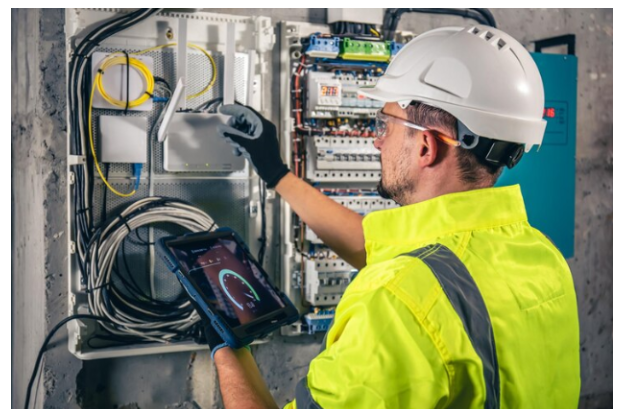Navigating the Future of Work with AI-Enhanced IT Solutions
Like any new technology, Artificial Intelligence (AI) has its supporters and sceptics. Regardless of these differing views, it’s clear that AI will impact every business – it’s just a matter of how. Whether you run a small business or lead a large company, understanding and using AI is essential in a digital-first world. Many who were initially doubtful about AI’s potential now see its benefits and are eager to integrate it into their operations.
AI isn’t just about doing the same tasks faster; it’s about achieving more with less effort. This technology is expanding what we can accomplish in a day’s work, making it vital for businesses to keep up and innovate. As technology and automation rapidly evolve, embracing AI is key for improved productivity, smarter decision-making and enhanced customer experiences.
In this article, we’ll explore how AI is changing the workplace, how to embrace this technology and the benefits it brings.
Key Areas of Transformation in the Workplace
AI is fundamentally changing how businesses operate and compete. Its algorithms and neural networks, inspired by human cognitive processes, empower machines to learn, adapt and make decisions in ways previously unimaginable. This transformative technology is reshaping multiple facets of the workplace, enhancing efficiency and enabling new possibilities.
Customer Service
Customer support has come a long way from the days of long hold times to meet today’s demand for fast, efficient and personalised assistance. AI-driven chatbots and virtual assistants have revolutionised how businesses interact with customers. Unlike human agents who operate within set hours, AI chatbots provide round-the-clock responses to customer inquiries which effectively reduce wait times and minimise customer frustration.
Advanced AI algorithms enable chatbots to analyse customer data and provide personalised interactions. By understanding preferences and past behaviours, AI-powered systems can tailor responses and recommendations, creating a more personalised customer experience. Additionally, by handling routine inquiries and tasks, AI chatbots free up human agents to focus on more complex issues that require human intervention. This division of labour optimises resource allocation and improves overall service delivery.
Decision-Making
Due to the sheer volume and complexity of data they generate, more and more businesses are turning to AI-powered technologies to help close the data-insight gap. Using AI algorithms, predictive models can accurately forecast trends and behaviours, enabling businesses to make informed decisions based on data rather than intuition alone. This data-driven approach supports proactive decision-making in time-critical, high-pressure situations, helping businesses anticipate challenges and optimise resource allocation.
Furthermore, AI converts complex data into easy-to-understand visual formats, making insights accessible and actionable for stakeholders across the organisation. This capability empowers decision-makers to identify trends, patterns and correlations at a glance, facilitating strategic planning and execution to maintain competitiveness in the marketplace.
Operational Efficiency
In business, time equals money. As such, more companies are turning to AI-driven automation to maximise their operational efficiency. AI effectively automates routine tasks like data entry, scheduling and inventory management. By taking on these repetitive tasks, AI not only saves valuable time but also reduces the chance of human error, thereby improving overall business operations.
Through advanced analytics and machine learning algorithms, AI can analyse vast amounts of operational data to identify inefficiencies within business processes and suggest improvements. By continually optimising processes based on changing demands and conditions, AI ensures that businesses operate smoothly and effectively. Moreover, AI’s role extends beyond efficiency gains. It significantly increases productivity by freeing up employees to focus on high-value work requiring human judgement and creativity, such as strategic planning and client interaction.
Embracing AI in the Workplace
As AI becomes more prevalent in the workplace, it means big changes for the way people do their jobs. So, how can companies encourage employees to embrace AI as a force for positive change?
- Highlight AI as a Complement, Not a Replacement: Make it clear that AI is designed to enhance human capabilities, not replace jobs. Explain how AI can assist with tasks, enabling employees to focus on higher-value work that requires creativity and critical thinking.
- Invest in Upskilling and Reskilling: Offer training and resources so employees can collaborate effectively with AI systems. Training should cover the practical use of AI tools, understanding AI principles and ethical guidelines for responsible AI use. This prepares employees to handle AI technologies responsibly and successfully.
- Foster a Culture of Continuous Learning: Promote a workplace that values ongoing learning and adapting to new technology. Encourage employees to stay informed about AI advancements through workshops, seminars and online courses. This cultivates a workforce that is adaptable and ready for change.
- Integrate AI in a Supportive Environment: Create a supportive and inclusive environment where employees can explore AI technologies without fear of making mistakes. Encourage experimentation and innovation, fostering collaboration between AI systems and human creativity to achieve breakthrough solutions that drive organisational efficiency.
- Define Clear Career Pathways: Establish transparent career pathways for roles that will be impacted by AI. Provide guidance and development opportunities that align with evolving job responsibilities enhanced by AI. This clarity ensures employees feel valued and motivated to progress within the organisation.
Final Thoughts
The integration of AI into the workforce marks an inevitable and transformative process that will redefine the future of work. While it poses challenges, particularly in terms of job displacement, it also presents significant opportunities for enhancing productivity, creating new job roles and improving work-life balance.
Businesses that embrace automation trends can significantly improve their operational efficiency and cultivate a more dynamic and innovative work environment. Moreover, by actively preparing employees through continuous learning, ethical training and adaptable career pathways, organisations can ensure that their workforce is not only ready but also thriving in this new era.
To navigate this transformation successfully, consider partnering with an IT support provider specialising in AI technologies. Such partnerships enable businesses to leverage cutting-edge IT solutions that support growth and success.
To find the best IT support provider in your area, do some research with a keyword search to get the names of reputable and recommended companies. For example, try ‘IT support Bristol or ‘AI IT solutions Plymouth’ to find a company near you.
Speak to them about your organisation’s IT needs and talk through how they can help you to develop an AI implementation strategy tailored to your business goals.



